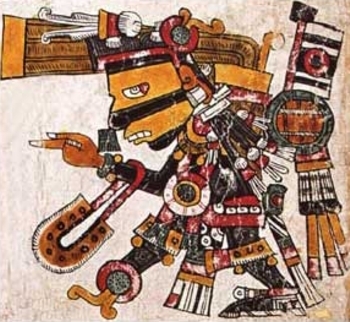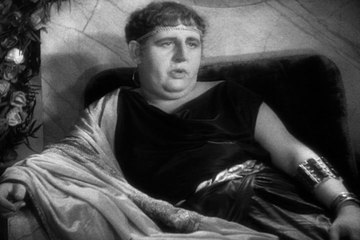Down to the real business of the poem. Nicole made a great post about fate and fortune, and Lucan misses no opportunity to tell us how Fortune is the supreme god at work here, having completely supplanted the less fickle Greek and Roman gods of old. Though plenty fickle themselves, they could be addressed. They could be appeased. They had reasonably clear motivations. Fortune is opaque, implacable, and plausibly malevolent. Lucan invokes Fortune constantly as the ultimate force behind everything.
Though Lucan does not personify Fortune in any meaningful way, the closest analogue I know for Fortune would be Tezcatlipoca (“Smoking Mirror”), the supreme god of the Aztecs (Mexica), also known by the epithets “Enemy of Both Sides” and “He Whose Slaves We Are.”
Inga Clendinnen memorably describes Tezcatlipoca in her interpretation:
Tezcatlipoca, unlike other Mesoamerican deities, did not represent a particular complex of natural forces. Nor did he provide an emblem of tribal identity. He was the deity associated with the vagaries of this world, of ‘the Here and Now’, as ubiquitous and ungraspable as the Night Wind: fickleness personified.
‘He only mocketh. Of no-one can he be a friend, to no-one true.’
Tezcatlipoca in the Mexica imagining of him was the epitome of the great lorrd: superb; indifferent to homage, with its implication of legitimate dependence; all bounty in his hand; and altogether too often not in the giving vein.
So it is with Fortune.
At the start of the poem, Caesar is Fortune’s favored child, and he knows it. He has the upper hand against the aging general Pompey (aka Magnus), who is formidable but unfavored. Anyone reading the poem will know that Caesar will win the war but soon be assassinated, Fortune having abandoned him, so it is temporary. Yet even Caesar seems to realize this, and plunges headlong as long as Fortune is at his back. With Fortune on his side, Caesar is portrayed as possessing strength and will beyond that of the old gods.
A striking scene appears in Book I, when Caesar is about to cross the Rubicon and meets a tearful apparition of Rome:
Now the cold Alps were past on Caesar’s course,
and in his mind the great revolts and coming war
had been conceived. At the waters of narrow Rubicon
the leader saw the mighty image of his fatherland
full of sorrow, trembling clearly in night’s darkness,
white hair disheveled on her head crowned with towers,
locks shorn and arms laid bare she stood before them;
choked by sobs she spoke: “How far will you go?
Where do you bear my standards, men? If you come
as lawful citizens, you must stop here.” Cold dread
seized their leader’s limbs. His hair stood high on end,
and faintness checked his footsteps at the river’s edge.Soon he spoke: “You who overlook the city’s walls
from Tarpeia’s rock, Thunderer, you Phrygian housegods
of Iulus’ clan, and secrets of Quirinus who disappeared,
and residing on high Alba, Jupiter of Latium,
and Vestal fires and you, O godly apparition,
Rome—favor my endeavors. No furious arms
attack you. See me, victor on land and sea,
Caesar, always and even now your soldier.
He will be guilty who made me your enemy.”Civil War I.200-220
Caesar hesitates briefly on seeing the ghost. He is not inhuman. But he responds with a skillfully rhetorical argument. (Rhetoric is very important at every level of Civil War.) He tells her that she should favor him, and that he is on her side. And he is on Rome’s side because Fortune is on his side. He will win, and so therefore he will be the protector of Rome. And thus he is already the protector of Rome; it’s just that a lot of people, including Pompey, don’t yet understand that.
This is hardly a valid argument, but the apparition does not have a chance to respond. The argument is enough to convince Caesar, and so he marches onward toward Rome. A running motif will be the power of speech to compel people to do almost anything, including die. Having crossed the Rubicon river, Caesar declaims to no one in particular how Fortune has put him above the law and above the gods:
“Here, right here, I shed peace and our defiled laws.
Fortune, I follow you. Faith can go to the winds—
I’ve put my trust in the Fates. Let war decide!”Civil War I.244-7
Caesar is conscious of his role as an agent of Fortune. He is certainly a power-hungry monster, but he also recognizes that he is rolling with the flow of fate, almost possessed by it. His men grumble and don’t particularly want to fight, but they don’t dare voice their fears, and when the venal Curio eggs Caesar on, it’s as though he were stoking a white hot furnace:
So [Curio] spoke, and though hell-bent on war already,
the speech adds rage and ignites the leader, as much
as clamor aids the Olympic stallion—though pent in
behind starting bars, he’s straining over the gates
and now leans hard to burst free from the bolts.Civil War I.317-21
Again, the language is that of surrendering to instinct and fate. By Book III, Caesar is openly proclaiming himself the chosen one to his troops:
These Greeks trust in vain the haste of my course!
For though we are in a hurry to get out west,
there’s time to destroy Massilia. Be glad, my cohorts!
Fate offers us spoils of wars along the way.
As a wind loses power—unless it runs up against
strong dense forests, it dissipates into empty space—
and as a great fire dies down when nothing obstructs it,
so not having enemies harms me. I think it a waste
of armed force if those I can conquer don’t fight back.Civil War III.373-382
I think this is more than mere simile. The Greek and Roman gods were notable in displacing gods of nature; relative to most cultures’ mythologies, there are far fewer nature gods, and by the time of the Iliad they have receded into the background, a point Moses Finley makes in his wonderful The World of Odysseus. Finley points out that sun god Helios is portrayed as mostly impotent and harvest/fertility goddess Demeter is just plain ignored. He attributes this to the Greek warrior culture enabling the elevation of the aristocratic Olympian gods.
But in Lucan, those gods are absent, and when invoked are useless. Mars is mentioned, but more as a metaphor rather than as any actual deity. The superhuman forces at work are natural, not supernatural. Wind, fire, and all the other elements of the celestial clock trump any action. And those elements are all components of Fortune and Fate. Wind and fire obey the laws of physics and nature; so Caesar obeys his laws of nature, which drive him to endless violence. In the case of Massilia, the village declares itself neutral and though Caesar could simply go on, he takes the time to destroy them. Because it’s his nature.
In such a world, knowledge is at best useless, and at worst a curse. Omens and forecasts only make you more aware of what you can’t control:
Why,
Ruler of Olympus, did you add these cares
to anxious mortals, to know future disasters
through dire omens? Either the creator of things,
when first flame abated and he obtained the reign
over rude and formless matter, fixed the causes
eternally—by which he holds all in order,
obeying the law himself—then partitioned
the world into ages, set limits for the fates;
or nothing is settled and fortune wanders uncertain,
twisting and turning events, and chance rules mortals.
May it be sudden, whatever you devise. Let
the minds of men be blind to future fate.
Leave them free to hope within their fears.Civil War II.4-17
Whether the world is order or chaos, we have no control over it. (I’m not sure why Lucan chooses to ask the Ruler of Olympus, however.)

